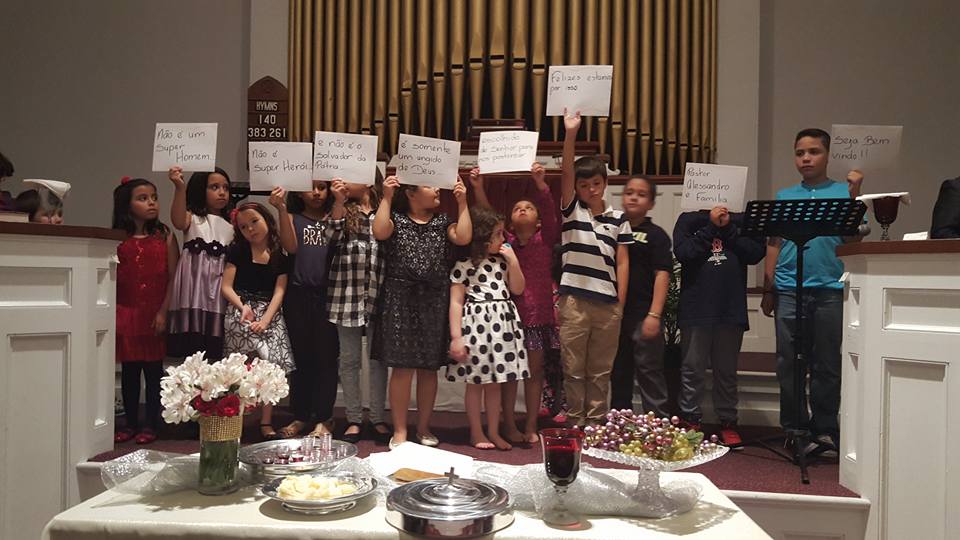"We came here to help people"
Synod’s Brazilian pastor is planting new worshiping communities to aid new immigrants and provide a place to call home.
By Patrick Heery
Earlier this year, an undocumented couple, who had immigrated to the United States from Brazil, sat in a courtroom in Lowell, Massachusetts, preparing to be deported. Their pastor, Paulo Lima, sat next to them, trying to keep his eyes off the hefty GPS devices that the Immigration and Customs Enforcement (ICE) had attached to their legs. Lima looked up when the judge made an unusual offer. To avoid deportation at this time, the judge said, the couple could be remanded into the pastor’s custody.
The judge explained that if Lima were to accept the arrangement, he’d be responsible for anything they do from here on. It was an intimidating responsibility to assume, Lima says. This couple had gotten into some trouble before joining the Portuguese-speaking church Lima founded in 2009 for Brazilian immigrants. But their lives changed dramatically, he says, after they got involved with the church.
Still, Lima was unsure. “If you give us this opportunity, if you give us this freedom, we promise not to let you down,” the couple told him. “We will be faithful.” They held hands and prayed. “Then my wife approached me and said, ‘We came here to help people. Let’s do this.’ So I signed the paper.”
Lima admits that he hasn’t done this for most people; that could be dangerous, he says. But Lima’s convinced that God was creating disciples that day. “They go wherever I go; they help whomever I’m helping,” he says. “They’re not bad people; they just had some bad times. Now they are the first ones to volunteer if I need help. They are the first to arrive at church and the last to leave.”
While the boldness of Lima’s actions that day may have been unusual, the spirit in which they were taken was not. “If they need something, we help,” Lima says, describing the six new worshiping communities he’s founded since coming to the United States from Brazil in 2006. “A lot of our people don’t have documentation, so, in our congregations, social services are ministries.” Lima’s churches help new immigrants find solutions to their problems, whether it’s legal assistance, education, transportation, or food.
“They don’t first come to the church to worship God; they come because they need help with immigration,” Lima admits, referencing a crisis in the United States that has left millions of undocumented immigrants vulnerable, stigmatized, and exploited. “But they stay for Jesus.”
Lima first came to the United States to assist another pastor in his ministry. He quickly discovered, however, that in many communities in Massachusetts and New Hampshire, Brazilian immigrants lacked a church home. They had worshiped as Presbyterians in Brazil, but now they weren’t able to find a Presbyterian, Portuguese-speaking congregation that understood the unique challenges and opportunities they were facing. Their only option was to go to a church of another tradition, but they weren’t comfortable, Lima says, with the theology or worship.
Lima soon felt called by God to form 15 new worshiping communities that serve Portuguese and Spanish-speaking immigrants in the Presbytery of Northern New England. (You can read more about his call and the beginnings of his ministry in this Presbyterian News Service article published in 2012.) Today, he divides his time between four fairly well established new worshiping communities and two smaller groups that are just beginning to take shape.
His hope is to continue pastoring his original congregation in Lowell, while developing the others till they can call their own pastor or rely primarily on leadership within the congregation. The church in Brocton, Massachusetts is already in the process of calling a pastor and has opened a music school to develop the leadership it’s currently lacking. Lima’s also running a Bible school to train future leaders within the other congregations.
Still, it’s not an easy calling. On any given Sunday, he may lead worship in three different congregations spread across two states. Worship typically lasts two hours, offering 15 minutes of prayer, a 45-minute sermon, projected music, and a praise band.
“Many people ask why I do this,” Lima says. “My answer is that I have to. I have a mission from God. And God gives me the energy to keep going.”
Church life extends far beyond Sunday worship. “As Presbyterians, we don’t just go to church and listen to a sermon; we care for people’s lives every day of the week,” Lima says. “We know each other. We are friends.” Weekly activities include Bible study, prayer, community events, immigration discussions, and mission.
That’s the mark of a sustainable congregation, Lima says—the fact that most members are coming during the week to study the Bible and pray. “I don’t measure the church by the weekend; I measure by the week.”
Though mostly on his own in this endeavor, Lima did receive help from two financial grants from the Presbyterian Mission Agency’s 1001 New Worshiping Communities initiative and they have received an Innovation Grant from the Synod of the Northeast. He’s looking forward to future collaboration both with his presbytery and the Synod.
He admits that, at first, this ministry was pretty tough… and pretty lonely. “Sometimes, in the beginning, I felt like God had called me to this place but then people didn’t want us here. It was hard to find acceptance,” Lima says, referencing the process of getting recognized by the presbytery and the challenges facing new worshiping communities that focus on new immigrants.
But nothing was going to stop Lima. There was a need, and he was determined to answer it.
“I call 50 to 60 people every day. Just brief messages, saying I’m praying for them. I invite them to church,” Lima says, describing the time-consuming work of evangelism. He also uses Twitter to check in with people and see how they’re doing. “One or two minutes for each message. That’s all it takes to tell them someone cares. You have to understand: these people are often here alone. They left behind family in Brazil, or Spain, or Colombia, or Mexico. When I call, they think to themselves, ‘Oh, someone remembers me. Someone cares about me.’ ”
Lima has to carry two cell phones in order to store all his contacts. “You have no idea how I feel about these people,” he says. “They lost something when they left Brazil. Now to see them find it again, to find a church home, to find Christ… I can’t even describe my feeling.”




